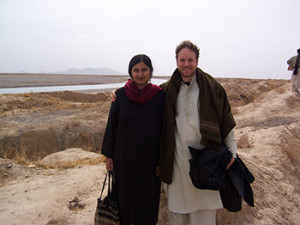KPFK’s Sonali Kolhatkar and Caltech’s Jim Ingalls offer a new way to look at Afghanistan
By Joe Piasecki 09/07/2006
Among progressive thinkers and anti-war activists, American foreign policy in Afghanistan is, at best, a gray area.
Feelings about the war in Iraq are comparatively simple: There were no weapons of mass destruction or terrorist connections, but there was plenty of money to be made by Bush administration cronies though lucrative oil and rebuilding contracts. Bring the troops home now!
But the mission in Afghanistan at least has something to do with the defense of America, right? Those who attacked the World Trade Center and the Pentagon on Sept. 11 were trained and encouraged by Osama bin Laden’s al-Qaeda, a group the indefensible, oppressive Taliban regime allowed to operate there.
That the left is questioning little about Afghanistan was illustrated by musician Neil Young’s comments during his Aug. 17 appearance on Comedy Central’s “Colbert Report.”
“The war in Afghanistan, trying to get the Taliban, that was a real war. That was like World War II. There was a meaning, there was a message, there was a reason,” said Young, whose anti-Iraq War album “Living with War” contains a song calling for the impeachment of President Bush.
Don’t make up your mind so fast, say KPFK-FM radio news host Sonali Kolhatkar and her husband, Caltech astronomer Jim Ingalls. The Pasadena couple’s new book, “Bleeding Afghanistan: Washington, Warlords and the Propaganda of Silence,” argues that America’s long and bloody involvement in Afghan affairs, the redistribution of power following Sept. 11 and new conflicts erupting in the area cloud the case for it being a “good” war.
“When 9/11 happened, it seemed to come out of a vacuum. These people, who knows why they hate us, what the connection is, but the Taliban are bad, we know that. There was just a trickling of information about the Taliban and their mistreatment of women getting into the consciousness of the American public before 9/11, but still no connection between US policy and the Taliban or their predecessors,” explained Kolhatkar, who hosts the morning radio program “Uprising” and heads a charity to support humanitarian work in Afghanistan.
What has been missing from the debate, she said, is not only a sense of history — that the US government created the conditions in Afghanistan that led up to Sept. 11 in its attempts to oust Soviet invaders during the Cold War — but also a sense of the present, an understanding that the ordinary people of Afghanistan have made few real gains since the American invasion. In fact, American authorities have restored power to many of the same brutal warlords that pulled the country into the Taliban-won civil war that raged after the Soviets were defeated.
“This whole notion that this was the right war assumes that fighting a war is going to somehow eradicate terrorism. What has it done? Five years later, Afghanistan has tons of suicide bombings. There were never suicide bombings in Afghanistan until last December. It is attracting terrorists, making people angry. The Taliban are gaining momentum and getting stronger,” explained Kolhatkar, who visited Afghanistan with Ingalls during several weeks last year.
On their trip, the couple discovered that continued violence by terrorists, warlords and armed bandits has undermined the quality of life in Afghanistan, especially for women, who aren’t any more liberated from poverty and sexist repression than they were before Sept. 11.
“We heard all of this stuff about schools reopening, a million girls back in school. In this past year, hundreds of girls’ schools closed down,” she said.
In addition to collecting research to support the analysis in their book, the couple’s trip to Afghanistan also allowed them to reconnect with members of the Revolutionary Association of the Women of Afghanistan (RAWA), a feminist humanitarian group run by native Afghans.
RAWA’s largest source of support is the Afghan Women’s Mission, a fundraising organization that Kolhatkar and Ingalls run out of Pasadena.
“We saw an amazing school in a remote rural area built out of funds that we raised,” said Ingalls, who described other RAWA activities as health clinics, orphanages and irrigation projects. However, a decrease in donations to the Afghan Women’s Mission since the invasion of Iraq diverted media attention from that country has slowed much of that work.
That harsh reality and the complications involved with
America’s terrorist hunt-and-kill campaign leave few simple answers as to what our country’s policy toward Afghanistan should be.
Due to years of civil war and the ongoing threat of internal violence, Afghan people tend to support having a foreign presence keep the peace, the couple found. Yet the American mission in Afghanistan, which ignores certain dangerous warlord groups while provoking daily violence in its never-ending manhunt for those who are deemed terrorists, isn’t doing that.
For Ingalls, the best thing Americans can do for the Afghan people is to help them improve the quality of their lives.
“It’s not a matter of doing a humanitarian favor for them. We owe them because of the destruction we sponsored in the 1980s to fight a war against the Soviets. We fomented these extremist groups that are still entrenched in Afghanistan, still terrorizing the people, that people still want out. We owe them reparations for the damage that was done,” said Ingalls.
“Bleeding Afghanistan” hits stores next week. A reading and signing is scheduled at 7 p.m. on Sept. 29 at the Eagle Rock Center for the Arts, 2225 Colorado Blvd., Eagle Rock.

